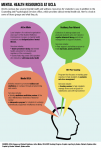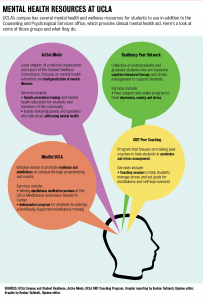The decision to walk into Counseling and Psychological Services and ask for help was one of the hardest I ever made.
It took months of coaxing from my family to convince me to stop putting off what I later found to be a relatively painless first experience at CAPS, which involved filling out forms and talking to a brief screen counselor. By the end of that first day, I was ready, even excited, to finally attend my first therapy session.
Unfortunately, that first session did not follow until the next week. And the next one did not follow until two weeks later. And then I found I would have to wait around 40 days for the next step in my treatment.
I am hardly the first person to notice that CAPS’ operations leave much to be desired. Students have been raising concerns over CAPS’ inefficient appointment scheduling system, the ineffectiveness of some clinicians’ methods of treatment and the yearly limit of six free counseling sessions for years now. The reason why little has changed is not groundbreaking: CAPS suffers from underfunding and understaffing. That’s why it is nowhere close to being able to provide adequate levels of treatment and care for students when they need it.
The best way for CAPS to expand its services and be more accessible to students is to coordinate with student mental health groups. CAPS has resources that can be used to educate students about counseling techniques. It should decentralize its counseling and support resources and coordinate with campus mental health organizations to provide complimentary counseling and therapy services. CAPS can leverage its student advisory board, which was created for just this purpose, to decentralize its counseling and support resources and coordinate with campus mental health organizations such as the Resilience Peer Network to provide complementary counseling and therapy services.
Christina Lee, the Undergraduate Students Association Council’s Student Wellness commissioner, said that even though CAPS has attempted to hire more clinicians to tackle the ever-increasing influx of new patients, the UCLA administration has been unhelpful in procuring more space for the CAPS offices. This is a major problem, especially since there is no easy way to solve it. UCLA is not entirely to blame, though, since space and funds are short on campus.
Currently, students who want to begin any kind of professional counseling treatment on campus need to do so at CAPS and this creates a bottleneck that in turn leads to delays that can last up to four or five weeks. For the most pressing cases, four to five weeks, or even more than a few days, is an unacceptable amount of time for a student to have to continue struggling.
Students with milder mental health concerns might be able to feel better after receiving peer support or participating in group therapy. Lee said groups like RPN train students to lead peer-to-peer support groups that reinforce internet cognitive behavioral therapy. However, she added RPN is still in its developmental stages and is not necessarily equipped to support students.
Lee also said that CAPS does not, at present, coordinate directly with any campus mental health efforts to provide counseling services. This kind of coordination is essential, however, since CAPS could work with groups like RPN to set up counseling outside their main location and reroute patients who do not require professional counseling to relieve some of the pressure on the CAPS system.
In fact, CAPS’ student advisory board has been proposing ways for CAPS to better coordinate with student groups. Tania Caceres, executive director of Active Minds atUCLA and a member of the student advisory board, said that in its first year, the board used suggestions from different student organizations to create a list of recommendations for CAPS.
But it has been more than a year since the board was created, and as Lee said there is still no coordination between CAPS and student groups on providing counseling to students; this is evidence the board still has a lot of work to do to streamline CAPS’ operations. Providing student groups like RPN, which is still in development, and GRIT Peer Coaching with resources to run peer support programs that primarily focus on mental health would help lighten the load on CAPS – and this should be an essential goal of the board.
Caceres added that improving the transportation for students who get referrals from CAPS to outside mental health providers and updating the CAPS website were two main recommendations from the student advisory board that are being implemented this year. Although these are concerns that can foreseeably impact students, neither of these issues are as pressing as the problem of treatment delays.
Training students to perform a simpler version of the role of therapists will not be an seamless solution, however. Clinical psychologists and clinical psychiatrists spend years at school learning to be competent at their profession and it is important to note that peer support is not and can never replace professional therapy. The students who lead peer support groups offer advice and support in the capacity of a peer, not a clinician, and any therapy students receive before or after their sessions with student groups always takes precedence.
But UCLA students deserve to have their mental health needs addressed by an accessible and affordable entity. And if CAPS cannot improve its services directly, then it should empower student groups that have the vitality and interest to help students as much as they can.

